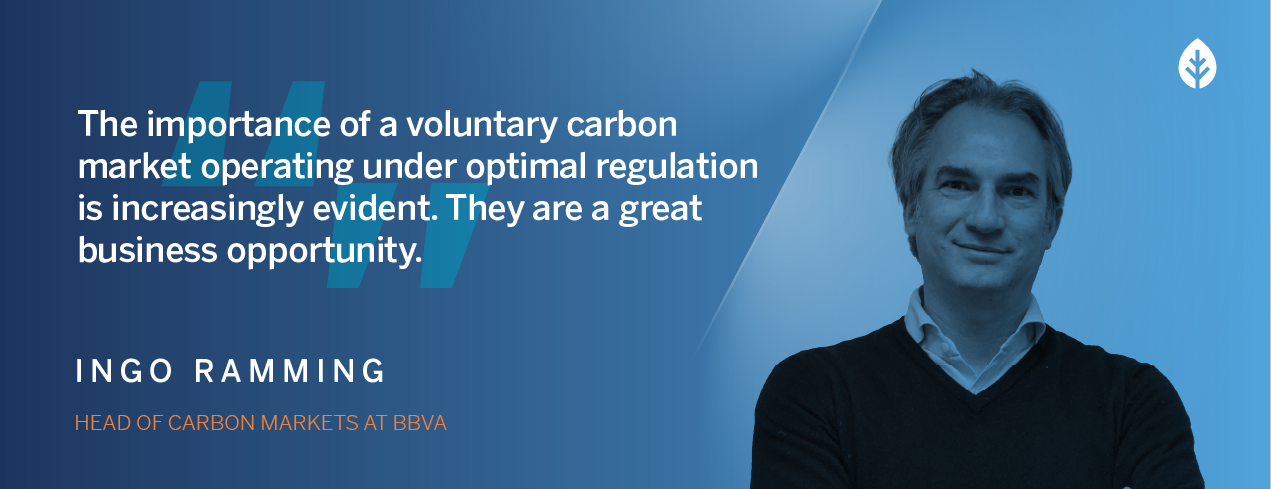
26 February 2024
The growing importance of the voluntary carbon market
Carbon markets play a key role in achieving the goals of the Paris Agreement by 2030 and carbon neutrality by 2050. Therefore, from BBVA CIB, we conducted a brief analysis of the current situation of this market and the challenges faced by companies, told by our expert Ingo Ramming, Head of Carbon Markets at BBVA.
In the last month, there have been over 2.7M public mentions related to carbon markets as a fundamental element in achieving a greener future. In our latest LinkedIn Trending Data newsletter, we have cross-referenced this data with the more than 452K mentions linked to #CarbonMarkets and more than 1.4M to #NetZero, #CarbonFootprint and #CarbonCredit, to bring you a brief analysis about the current state of this market and the challenges that remain to be addressed by companies.
The Voluntary Carbon Market is essential in building a greener and more inclusive future by public and private actors. With sustainability as a strategic priority for the BBVA Group, carbon markets play an important role in addressing this challenge.
Putting a price on carbon incentivizes changes in behavior and investments in innovation. With this, carbon Taxes, Emissions Trading Systems (ETS), the Voluntary Carbon Market, and Offsetting have become crucial for the transition. Corporations from energy-intensive industries, utilities, airlines, and shipping are included in the EU ETS. Companies purchase carbon allowances to meet regulatory requirements, e.g., in the EU Emissions Trading System (EU ETS). The main buyers are energy, automotive, transport companies (such as airlines), technology companies, and financial institutions.
Carbon taxes, Emissions Trading Systems, the Voluntary Carbon Market and Offsetting are crucial to the transition to a greener future.
Worldwide, 73 carbon pricing initiatives are implemented in 39 national jurisdictions, and about half of the nations that signed the Paris Agreement plan robust market-based approaches. In 2023, the turnover in global carbon markets was nearly EUR 900 billion. Compliance markets, especially the EU Emissions Trading System, dominate, but significant growth in the voluntary carbon markets is expected in the coming years.
The role of financial institutions like BBVA, with its sustainable Carbon Markets range, is to provide expertise and access to carbon markets. With that, we support clients in managing regulatory risks and voluntary commitments as part of their journey toward Net Zero emissions.
In the words of an expert

A market on the rise: Voluntary Carbon Markets
As companies commit to reducing their emissions and investors demand clear and credible transition plans, the importance of a voluntary carbon market operating under optimal regulations is becoming increasingly apparent. These markets are a crucial pillar of BBVA's sustainability strategy and a great business opportunity. The Group helps its clients on these matters, providing them with the help they need to manage and mitigate their climate risks.
Despite the progress achieved in the Voluntary Carbon Market, significant challenges are yet to be addressed, mainly related to building a good product and its proper use:
- The main challenge is related to integrity. Part of it relates to the demand-side, uncertainties related to companies' claims, and how to use carbon credits to offset GHG emissions.
- Moreover, defining high-quality carbon credits, the supply side of the Voluntary Carbon Market, is challenging. Complexity creates barriers. Therefore, we need to improve the carbon literacy. Standardization will make it easier for buyers to purchase high-quality credits.
- Transparency. Companies need to be more transparent about their decarbonization strategies. Therefore, a positive narrative on using carbon credits is required, which provides top management and investors with a clear justification to contribute capital to the global climate transition at a sufficient scale.
At BBVA CIB, we believe that carbon markets play a crucial role in achieving the goals of the Paris Agreement by 2030 and carbon neutrality by 2050, as well as being an essential line in the sustainability strategy and a great business opportunity. This is why the group established a carbon markets business line in 2022 to support clients in managing their regulatory or voluntary carbon risks and maximize opportunities.
Besides, the bank co-founded Carbonplace together with eight other banks. Carbonplace will be essential in scaling the Voluntary Carbon Market by enabling a secure and scalable transfer and the settlement of Voluntary Carbon Credits (VCC).




